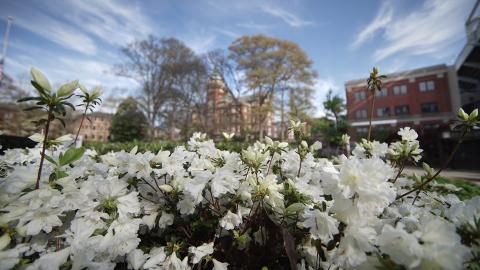Georgia Tech will celebrate its 25th annual Earth Day with a week of events. The celebration kicked off earlier today with a keynote event featuring Vice President for Infrastructure and Sustainability Maria Cimilluca. She shared her inspiring vision for the future of sustainability at Georgia Tech.
"The Institute's strategic plan asks us to envision an institution that leverages its unmatched scale and resources to address the most crucial challenges of our time,” Cimilluca said. “I see the Institute's sustainability plan as one of the many pathways for collaboration, innovation, and action that will lead us toward transformations in research, applied technologies, culture, and ultimately a more sustainable future."
Georgia Tech first celebrated Earth Day in 1997. For many years the celebration was a one-day, afternoon event. In 2020, it was expanded but held virtually due to the Covid-19 pandemic. Held in person last year, the event featured The Kendeda Building for Innovative Sustainable Design’s Living Building Certification by the International Living Futures Organization, and President Cabrera cut the ribbon for the grand opening of the EcoCommons. These two areas on campus represent Georgia Tech’s commitment to sustainability and serve as living, learning laboratories for students, faculty, and staff.
Event co-chairs Anne Rogers, associate director of the Office of Campus Sustainability, and Emma Brodzik, campus sustainability project manager, have planned a strong lineup of events for this 25th anniversary. From a bike ride with President Cabrera, to a waste audit of the Clough Undergraduate Learning Commons, to a bird walk and tree planting, this year’s “Down to Earth” event offers many opportunities to celebrate nature and learn about new and innovative ways to protect and preserve our planet.
As is the tradition, this year’s theme and logo were chosen from a student design contest. The winner, Abhinav Thukral, is a graduate student in human and computer interaction. “I think it’s incredibly important to be aware of how our activities affect the planet and to learn sustainable ways to progress as a community,” Thukral said. “Earth Day is essential to reflect on some of the environmental issues we face today and how we might work together to address them.”
Students have often requested to work with campus operations to manifest positive environmental change by engaging with the staff of Infrastructure and Sustainability. This unit is responsible for providing sustainable, safe, and well-maintained campus facilities. For example, recent Carbon Reduction Challenge winners aided in implementing the replacement of existing fluorescent lighting with LED in a wing of the Petit Institute for Bioengineering and Bioscience building. By working with the Building Engineering and Energy Strategies department, this improvement will yield more than 250,000 pounds of carbon dioxide reduction per year. Another area where students are proactive is recycling. When the need for acrylic shields lessened as the intensity of the pandemic waned, student volunteers from the Office of Minority Education assisted campus staff in collecting 800 pounds of acrylic and PVC for recycling.
These types of student-led collaborative efforts are encouraged. If your organization or class would like to collaborate with Infrastructure and Sustainability, use this form to get started.

